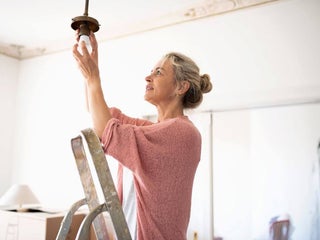Summary
As a woman, the home buying odds are not always in your favor. But the interest rates are so low – and in some markets, the housing prices are so soft – that if you can qualify for a mortgage, this is a prime time to purchase a house.
The content on this page is accurate as of the posting date; however, some of our partner offers may have expired. Please review our list of best credit cards, or use our CardMatch™ tool to find cards matched to your needs.
A recession can be a great time for a single woman to buy a home. But because single women tend to be lower-paid and less financially stable than single men or married couples, they are often unable to purchase during economic downturns, experts say.
The nature of the pandemic may make it even harder for women to buy a home. With economic times so uncertain, banks want ever-greater assurances that a borrower can make her payments. Add to that long-standing inequities in mortgage lending rates and a cultural resistance to tough negotiating tactics by women, and the current picture can look rather daunting.
Still, “One hundred percent, I believe women should buy a house right now,” said Justine Chan, founder of Live with Plum, a website that teaches women about how to buy homes. Mortgage rates are at historic lows, she said, making borrowing cheaper. And in some parts of the country, home prices have dropped as well.
Is now the right time for women to buy a home?
- Banks tightening lending standards amid coronavirus
- Pandemic-driven unemployment has put many women behind
- Women make up a large percentage of homebuyers, but get worse terms
- A combination of factors results in higher overall costs
- Despite roadblocks, now is still a good time to buy
- Readying your credit and negotiation strategy for home buying
Banks tightening lending standards amid coronavirus
In the wake of pandemic-induced business closures and general economic instability, banks are tightening mortgage eligibility requirements. They’re looking for credit scores in the low 700s at minimum, Chan said.
See related: Building a mortgage-worthy credit profile
They are also looking for nearly iron-clad proof of employment. Michelle Heller, a real estate agent in Los Angeles, had one client, a forensic psychologist, lose her pre-approved mortgage once the pandemic hit because she was self-employed – even though her income was in excess of $400,000 a year.
“If a mortgage broker is approving you for a loan at this point, you are very low risk,” Heller said.
Pandemic-driven unemployment has put many women behind
Women have been disproportionately hit by layoffs and furloughs during the pandemic, perhaps because many work in the struggling retail, tourism and hospitality sectors. In May, nearly 14% of U.S. women over the age of 20 were unemployed, compared with less than 12% of men.
The employment picture looks even more lopsided when broken down by race. Some white workers returned to work in May, with their overall jobless rate dipping to 12.4%. But unemployment rates continued to inch up for Asian workers (15%), Black workers (16.8%) and, although improving slightly, remained high for Latinx workers as well (17.6%). (The U.S. Bureau of Labor statistics does not break down unemployment numbers by gender and race simultaneously.)
Women make up a large percentage of homebuyers, but get worse terms
Even when women are employed, they tend to make less than men do, and Black women and Latinas tend to make less than white women.
In general, then, “it’s going to be harder for women who are making less than men to be able to qualify for these higher mortgage requirements,” Chan said.
The struggle may be more profound for women of color than for white women.
“There’s this unique experience of double jeopardy, a tax if you will, that women of color have to endure based upon gender and race,” said Lori Latrice Martin, a professor of sociology at Louisiana State University, and one of only a few academics to study how the intersection of gender and race impacts homeownership.
Still, nearly twice as many single women purchase homes as single men. Some characteristics of that female homebuyer:
- She has the lowest income, on average, of all homebuyers, at $65,000.
- She is likely to be on the older side – 22% of homebuyers between the ages of 65 and 74 are single women.
- She’s also more likely to be a person of color. About 34% of female-only borrowers are ethnic minorities, compared with 32% of single male buyers and about a quarter of mixed-gender, couple borrowers.
Single women tend to have similar credit scores to single men, a 2016 study by the Urban Institute found. But because women earn less and own less than men do (one study found women own 32 cents to every dollar owned by a man), they have weaker credit profiles overall. And as a result, they are more likely to be denied a mortgage, even in good economic times. A study by the Woodstock Institute found that in 2017, 8% of men and 9% of women were denied mortgages.
Women who do get mortgages pay more for them than men do, but they are also lower-risk borrowers, according to the Urban Institute study.
“Women with a credit score of 680 aren’t as high risk as men at 680,” said Jun Zhu, a nonresident fellow at the institute and one of the authors of the study. “If you give a woman and a man the same credit profiles, women actually default less. They perform better than their credit profiles suggest.”
A combination of factors results in higher overall costs
The inequalities continue when it comes time to buy and later to sell the property. Women spend about 2% more to buy a home than single men, and when they sell, they make about 2% less on that transaction as well, reported two Yale professors, Kelly Shue and Paul Goldsmith-Pinkham, in a study published in January.
“It seems like women are at quite a large disadvantage when buying and selling homes,” Shue said.
Part of the reason is due to negotiating. It’s not that women don’t know how to negotiate or refuse to do it, Shue said. It’s just that when they try to play hardball like a man, they get punished for it.
“For the same kind of lowball offer in negotiation, the other side is more likely to be offended and walk away if it comes from a woman, whether the other side is male or female,” she said. “There’s this expectation that women are more civil, that they should be willing to share the surplus with others.”
Despite roadblocks, now is still a good time to buy
As a woman, the home buying odds are not always in your favor. But the interest rates are so low – and in some markets, the housing prices are so soft – that if you can qualify for a mortgage, this is a prime time to purchase a house, experts say.
“Here are my two checkboxes,” Chan said. “The first is, are you financially stable? Do you have job security? And the second box is, is your credit score high enough to qualify for a mortgage right now?
“If you check both those boxes,” she said, “for a majority of markets, it’s a good time to buy.”
Readying your credit and negotiation strategy for home buying
If your credit score is low, that doesn’t have to be a permanent hurdle. Check your credit report for any errors, pay your bills on time and pay down your debt, said Andrina Valdes, COO of Cornerstone Home Lending in San Antonio. Many loans for first time buyers may also have more flexible credit requirements, she said.
Beyond making yourself an attractive candidate for a lender, there’s not much more you can do on the mortgage front. But you can learn how to negotiate effectively to get the best price when you do buy.
Margaret Neale, a professor of management at Stanford University’s business school, has studied the science of negotiating for years and even teaches courses on it. Women, said Neale, “need to think about a negotiation in a different way – not as a battle, but as problem solving.”
This conclusion was supported by a recent paper titled, “The Dynamics of Gender and Alternatives in Negotiation.” The study’s other authors are Jennifer Dannals of Dartmouth College, Julien Zlatev of Harvard University and Nir Halevy, also of Stanford University.
The researchers looked at data from years of negotiations done in MBA classes and executive seminars. They looked at pairs of negotiators – two women, two men or a man negotiating with a woman. They also compared the outcomes of the negotiations when one or both of the parties had either a good alternative or a bad alternative to the negotiation.
What the researchers concluded, Neale said, was it all came down to how the women were perceived, and not just by men, but by women as well.
“What we found is when women have good alternatives, they act just the same as men with good alternatives, but that level of aggression in women is punished in ways that it is not for men,” she said. “Women end up with an impasse while men end up getting more in an agreement.”
Instead of trying to strong-arm negotiations, women will do best when they come to the table fully prepared, having thought out not only their position but what the other party may want and need as well, Neale said.
Understand going into negotiations exactly what you desire: What is the most you will pay, and at what point are you willing to walk away? Then think about your counterpart – what will make it easy for them to say yes?
“You need to understand what kind of deal is at least going to keep your counterpart whole,” she said.
Finally, remember one critical rule of home buying, one that can often get lost in the emotion of touring properties, negotiating with sellers and applying for financing: “Never fall in love with one of anything,” she said, “especially when you are buying a house.”
Editorial Disclaimer
The editorial content on this page is based solely on the objective assessment of our writers and is not driven by advertising dollars. It has not been provided or commissioned by the credit card issuers. However, we may receive compensation when you click on links to products from our partners.



